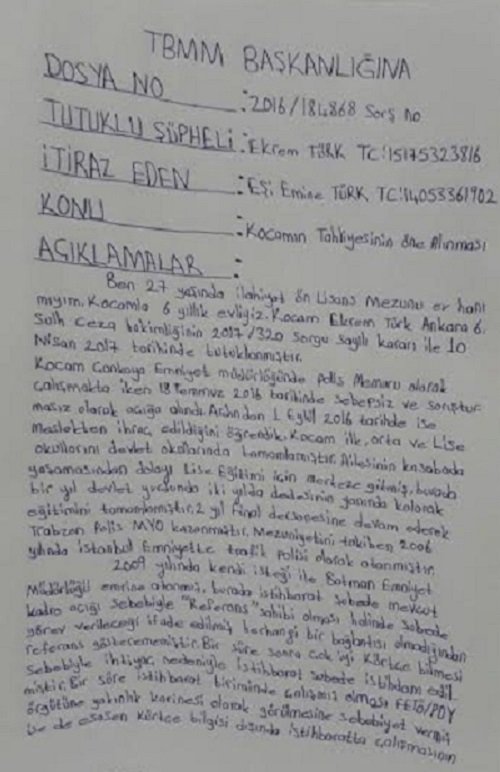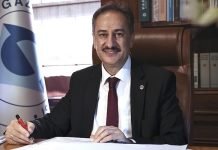A 34-year old police officer who intervened into the advance of army tanks in Turkish capital and helped push putschist back on the day of failed coup bid of July 15, 2016 was arrested on coup charges and now suffers serious health troubles in jail.
 Ekrem Türk, a police officer for ten years, was assigned to Cebeci police station in Ankara on the night of the coup attempt. He and his colleagues responded to the scene in Dikimevi Junction when his superiors ordered them to intervene into coup plotters. He and his buddy rendered two army tanks inoperable. He almost suffered a run-over by one of the tanks.
Ekrem Türk, a police officer for ten years, was assigned to Cebeci police station in Ankara on the night of the coup attempt. He and his colleagues responded to the scene in Dikimevi Junction when his superiors ordered them to intervene into coup plotters. He and his buddy rendered two army tanks inoperable. He almost suffered a run-over by one of the tanks.
Three days later, Türk was suspended from the police force on alleged coup charges and links to Gülen movement. He was dismissed on Sep.1, 2016 and his home raided by his police colleagues. Because of what the doctors believe caused by the stress, he started to having blood in his stool and urine. They did not have health benefits following the purge from the force but had to rush to the hospital on April 10, 2017. His wife sold his gold wedding ring to pay the bill for hospital visit.
In the hospital visit, doctors recommended that Türk should stay in the hospital on emergency basis to monitor his health, run up some tests to diagnose the problem and treat him accordingly. He was put in a bed and hooked to IV drip. Yet within an hour of his hospitalization, police raided the hospital and detained Türk on his sick bed.

In prison, he suffered from an emergency health problem and was rushed to the Numune Hospital in Ankara on April 13, 2017. He stayed in the bed unconscious for four days. Doctors recommended a surgery to treat him and said his colons must be removed. Despite his serious health troubles, authorities have not released him from pre-trial detention. His wife, Emine Türk, who was notified about her husband’s hospitalization a week later was refused permission to accompany him at the hospital.
Emine Türk appealed with the prosecutor’s office, has written letters to the Turkish Parliament, the office of the Prime Ministry and the Office of the Presidency but has not received a positive response to her appeal on behalf of her bed-ridden husband. She saw her husband last time in the hospital on April 24, 2017.
Türk, coming from a poor family, was educated in Turkey’s public schools and stayed in dorms maintained by the government for kids from lower income families. He was successful in the high school and accepted to the police vocational school in Trabzon in 2004. After graduation in 2006, he started out at traffic cop. In 2009, he was recruited by the intelligence branch when he was the top winner on the examination among 300 select candidates in the police force. He served as intelligence officer for five years in the southeastern province Batman. He entered police chief exams and made it to be deputy police chief. Citing health issues he and his wife were facing, he asked to be transferred to Ankara.
10,732 police officers have been jailed since July 15, 2016, according to a statement from Turkey’s Interior Minister Soylu on April 2, 2017. Soylu said that a total of 113,260 people have been detained as part of investigations into the Gülen movement in the last eight months alone, while 47,155 were put into pre-trial detention.
Turkey survived a military coup attempt on July 15 that killed over 240 people. Immediately after the putsch, the Justice and Development Party (AKP) government along with Turkey’s autocratic President Erdoğan pinned the blame on the Gülen movement despite the lack of any evidence to that effect.
Although the Gülen movement strongly denies having any role in the putsch, the government accuses it of having masterminded the foiled coup. Fethullah Gülen, who inspired the movement, called for an international investigation into the coup attempt, but President Erdoğan — calling the coup attempt “a gift from God” — and the government initiated a widespread purge aimed at cleansing sympathizers of the movement from within state institutions, dehumanizing its popular figures and putting them in custody.
May 2, 2017



















